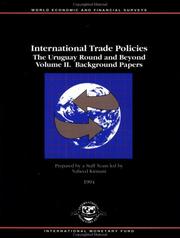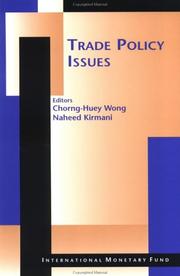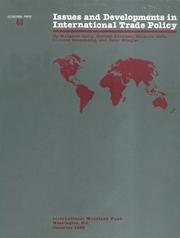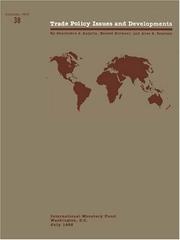| Listing 1 - 10 of 12 | << page >> |
Sort by
|
Article
Abstract | Keywords | Export | Availability | Bookmark
 Loading...
Loading...Choose an application
- Reference Manager
- EndNote
- RefWorks (Direct export to RefWorks)
Article
Abstract | Keywords | Export | Availability | Bookmark
 Loading...
Loading...Choose an application
- Reference Manager
- EndNote
- RefWorks (Direct export to RefWorks)

ISBN: 1557754691 1557754578 Year: 1994 Publisher: Washington, D.C. IMF
Abstract | Keywords | Export | Availability | Bookmark
 Loading...
Loading...Choose an application
- Reference Manager
- EndNote
- RefWorks (Direct export to RefWorks)
handel, internationaal --- handelspolitiek, internationaal --- IMF --- Foreign trade policy --- 339.5 --- 339.542 --- 339.54 --- (100) --- $?$95/02 --- 336.748.8 IMF --- 337.3 GATT --- 339.5 Buitenlandse handel. Internationale handel. Ruilvoet --- Buitenlandse handel. Internationale handel. Ruilvoet --- Internationaal Monetair Fonds - IMF --- GATT --- Commercial policy --- Tariff --- Ad valorem tariff --- Border taxes --- Customs (Tariff) --- Customs duties --- Duties --- Fees, Import --- Import controls --- Import fees --- Tariff on raw materials --- Indirect taxation --- Revenue --- Customs administration --- Favored nation clause --- Non-tariff trade barriers --- Reciprocity (Commerce) --- International trade --- International trade policy --- Trade policy --- Economic policy --- International economic relations --- Government policy --- International Monetary Fund --- Internationaal monetair fonds --- International monetary fund --- Uruguay Round, 1987-1994 --- AA / International- internationaal --- 382.30 --- 334.81 --- NBB multivolumes --- Handels- en wisselpolitiek in hun verband met de buitenlandse handel: algemeenheden. --- Wereldhandelsorganisatie (WHO). Algemene overeenkomst voor handel en tarieven (GATT). --- concurrentie, internationaal --- Tarif douanier --- Politique commerciale --- Uruguay Round --- IMF. --- Handels- en wisselpolitiek in hun verband met de buitenlandse handel: algemeenheden --- Wereldhandelsorganisatie (WHO). Algemene overeenkomst voor handel en tarieven (GATT) --- International Monetary Fund.

ISBN: 155775621X 1462385451 9786613847584 1455240613 1455291145 1283535130 9781455240616 9781557756213 Year: 1997 Publisher: Washington, D.C. IMF
Abstract | Keywords | Export | Availability | Bookmark
 Loading...
Loading...Choose an application
- Reference Manager
- EndNote
- RefWorks (Direct export to RefWorks)
This book edited by Chorng-Huey Wong and Naheed Kirmani, examines a wide range of trade policy issues relevant in the 1990s that were the subject of a seminar organized by the IMF in 1996. The topics include the design and implementation of trade reform, trade liberalization in industrial and transition economies, regional trading arrangements, the impact of the Uruguay Round, the role of the World Trade Organization, and post Uruguay Round issues.
International finance --- Commercial policy --- Free trade --- Politique commerciale --- Libre-échange --- Congresses --- Congrès --- World Trade Organization --- Uruguay Round --- 339.54 --- -Free trade --- -AA / International- internationaal --- 382.30 --- 382.50 --- 334.81 --- 382 --- 382.14 --- 382.1 --- 330.191.6 --- Free trade and protection --- Trade, Free --- Trade liberalization --- International trade --- Foreign trade policy --- International trade policy --- Trade policy --- Economic policy --- International economic relations --- Buitenlandse economische politiek. Buitenlandse handelspolitiek. Instrumentarium van de buitenlandse handel --- Handels- en wisselpolitiek in hun verband met de buitenlandse handel: algemeenheden. --- Internationale handelsbetrekkingen: algemeenheden. --- Wereldhandelsorganisatie (WHO). Algemene overeenkomst voor handel en tarieven (GATT). --- internationale handel - wereldhandel - buitenlandse handel --- internationale handelspolitiek --- handelspolitiek --- wereldeconomie - internationale economie --- Government policy --- -Biśva Bāṇijya Saṃsthā --- Dėlkhiĭn Khudaldaany Baĭguullaga --- DTÖ --- Dünya Ticaret Örgütü --- Munaẓẓamat al-Tijārah al-ʻĀlamīyah --- O.M.C. --- OMC --- ʻOngkān Kānkhā Lōk --- Organisation mondiale du commerce --- Organização Mundial do Comércio --- Organización Mundial de Comercio --- Organización Mundial del Comercio --- Organizația Mondială de Comerț --- Organizzazione mondiale del commercio --- Organizzazione mondiale per il commercio --- Qaṅgkār Bāṇijjakamm Bibhab Lok --- Sāzmān-i Tijārat-i Jahānī --- Shi jie mao yi zu zhi --- SOT --- Světová obchodní organizace --- Svitova orhanizat︠s︡ii︠a︡ torhivli --- Światowa Organizacja Handlu --- Tổ chức thương mại thế giới --- Viśva Vyapāra Saṅgaṭhana --- Vsemirnai︠a︡ torgovai︠a︡ organizat︠s︡ii︠a︡ --- VTO --- W.T.O. --- Welthandelsorganisation --- World Trade Organisation --- WTO --- منظمة التجارة العالمية --- 世界貿易組織 --- 世界贸易组织 --- General Agreement on Tariffs and Trade (Organization) --- Uruguay Round, 1987-1994 --- -Congresses --- Commerce --- Business & Economics --- International Commerce --- 339.54 Buitenlandse economische politiek. Buitenlandse handelspolitiek. Instrumentarium van de buitenlandse handel --- Libre-échange --- Congrès --- Biśva Bāṇijya Saṃsthā --- Cycle d'Uruguay --- Gyros Ourougouaēs --- Gyros tēs Ourougouaēs --- Jawlat Ūrūjuwāy --- Multilateral Trade Negotiations, the Uruguay Round --- Negociaciones Comerciales Multilaterales, Ronda Uruguay --- Négociations commerciales multilatérales, Cycle d'Uruguay --- Putaran Uruguay --- Ronda Uruguay --- Rō̜p ʻUrukwai --- Uruguai Raundŭ --- Uruguay Round of MTNs --- Uruguay Round of Multilateral Trade Negotiations --- Uruguay Runde --- Urugwai Raundŭ --- Wu-la-kuei hui ho --- AA / International- internationaal --- Wereldhandelsorganisatie (WHO). Algemene overeenkomst voor handel en tarieven (GATT) --- Handels- en wisselpolitiek in hun verband met de buitenlandse handel: algemeenheden --- Internationale handelsbetrekkingen: algemeenheden --- Congresses. --- E-books --- Exports and Imports --- Macroeconomics --- Taxation --- Agribusiness --- Investments: Commodities --- Trade Policy --- International Trade Organizations --- Trade: General --- Agriculture: General --- Agriculture: Aggregate Supply and Demand Analysis --- Prices --- Neoclassical Models of Trade --- International economics --- Public finance & taxation --- Agricultural economics --- Investment & securities --- Tariffs --- Exports --- Imports --- Taxes --- Tariff --- United States

ISBN: 1557750378 1455281530 1455271446 9781557750372 Year: 1988 Volume: 63 Publisher: Washington, D.C. International Monetary Fund
Abstract | Keywords | Export | Availability | Bookmark
 Loading...
Loading...Choose an application
- Reference Manager
- EndNote
- RefWorks (Direct export to RefWorks)
This paper discusses reviews major issues and developments in the trade area and outlines the problems in the multilateral trading system that governments face as they seek to liberalize trade in the Uruguay Round of trade negotiations. The paper’s emphasis is on policy developments in the major trading nations as they relate to trade in both industrial and agricultural products. The survey also includes a review of trade policies in developing countries and refers to available quantitative evidence on protectionism wherever possible. The increased use of nontariff measures reflects, in part, the fact that most industrial countries have “bound” a considerable proportion of their tariffs, particularly on industrial products, at relatively low levels. Restrictions are particularly widespread in industries suffering from excess capacity (such as steel) and where comparative advantage has generally shifted to developing countries. The lack of major liberalization in agriculture in the US–Canada Free Trade Agreement has led some industrial countries to suggest that the US interest in multilateral negotiations is now primarily in agriculture and in some selected new areas, such as telecommunications, banking, and patent protection.
Foreign trade policy --- Commercial policy --- International trade --- Politique commerciale --- Commerce international --- 339.54 --- 339.5 --- (100) --- $?$89/9 --- politique economique --- commerce mondial --- AA* / International - Internationaal --- 382.50 --- 382.3 --- 330.05 --- External trade --- Foreign commerce --- Foreign trade --- Global commerce --- Global trade --- Trade, International --- World trade --- Commerce --- International economic relations --- Non-traded goods --- International trade policy --- Trade policy --- Economic policy --- Buitenlandse economische politiek. Buitenlandse handelspolitiek. Instrumentarium van de buitenlandse handel --- economisch beleid --- wereldhandel --- Internationale handelsbetrekkingen: algemeenheden. --- Government policy --- Working papers --- Commercial policy. --- International trade. --- 339.54 Buitenlandse economische politiek. Buitenlandse handelspolitiek. Instrumentarium van de buitenlandse handel --- Internationale handelsbetrekkingen: algemeenheden --- Investments: Commodities --- Exports and Imports --- Macroeconomics --- Taxation --- Agribusiness --- Trade Policy --- International Trade Organizations --- Trade: General --- Agriculture: General --- Price Level --- Inflation --- Deflation --- Foreign Exchange --- Agriculture: Aggregate Supply and Demand Analysis --- Prices --- International economics --- Public finance & taxation --- Investment & securities --- Agricultural economics --- Exports --- Tariffs --- Imports --- General Agreement on Tariffs and Trade --- Trade barriers --- Taxes --- Tariff --- Commercial treaties --- United States
Book
Year: 1982 Publisher: Washington (D.C.): International monetary fund,
Abstract | Keywords | Export | Availability | Bookmark
 Loading...
Loading...Choose an application
- Reference Manager
- EndNote
- RefWorks (Direct export to RefWorks)
Book
Year: 1983 Publisher: Washington (D.C.) IMF
Abstract | Keywords | Export | Availability | Bookmark
 Loading...
Loading...Choose an application
- Reference Manager
- EndNote
- RefWorks (Direct export to RefWorks)

ISBN: 0939934469 1455247855 1452795371 9780939934461 Year: 1985 Volume: 38 Publisher: Washington, D.C. IMF
Abstract | Keywords | Export | Availability | Bookmark
 Loading...
Loading...Choose an application
- Reference Manager
- EndNote
- RefWorks (Direct export to RefWorks)
This paper discusses the salient features of recent developments and outlines the prospects for trade policy by highlighting the main issues that will determine the scope and timing of liberalization under a possible new General Agreement on Tariffs and Trade (GATT) round of multilateral trade negotiations. As the more advanced developing countries acquire the skills and investments to diversify exports toward more sophisticated manufactured products, restrictions against them tend to multiply. These not only impede the export prospects of the developing countries directly affected, but also slow specialization and diversification, thus severely affecting the smaller developing country exporters. Across-the-board protectionist measures have been avoided in the industrial countries because it is widely acknowledged that trade restrictions and protectionism are inappropriate responses to exchange rate developments. Exchange rate movements reflect financial flows as well as trade flows, and the importance of exchange rates that correspond to underlying economic fundamentals is unquestioned.
Foreign trade policy --- Commercial policy --- 339.54 --- commerce mondial --- relations economiques internationales --- commerce exterieur --- gatt --- investissements etrangers --- pays en voie de developpement --- protectionnisme --- AA* / International - Internationaal --- LDC / Developping Countries - Pays En Développement --- 382.30 --- 382.32 --- 330.05 --- 382 --- International trade --- International trade policy --- Trade policy --- Economic policy --- International economic relations --- Buitenlandse economische politiek. Buitenlandse handelspolitiek. Instrumentarium van de buitenlandse handel --- wereldhandel --- internationale economische betrekkingen --- buitenlandse handel --- buitenlandse investeringen --- ontwikkelingslanden --- protectionisme --- Handels- en wisselpolitiek in hun verband met de buitenlandse handel: algemeenheden. --- Protectionisme. --- Government policy --- Working papers --- Commercial policy. --- 339.54 Buitenlandse economische politiek. Buitenlandse handelspolitiek. Instrumentarium van de buitenlandse handel --- Handels- en wisselpolitiek in hun verband met de buitenlandse handel: algemeenheden --- Protectionisme --- Investments: Commodities --- Exports and Imports --- Macroeconomics --- Taxation --- Agribusiness --- Trade Policy --- International Trade Organizations --- Trade: General --- Agriculture: General --- Price Level --- Inflation --- Deflation --- Agriculture: Aggregate Supply and Demand Analysis --- Prices --- International economics --- Public finance & taxation --- Investment & securities --- Agricultural law --- Imports --- Trade barriers --- Exports --- General Agreement on Tariffs and Trade --- Tariffs --- Taxes --- Commercial treaties --- Tariff --- United States
Book
ISBN: 1462364322 1455264881 1557750602 Year: 1982 Publisher: Washington, D.C. : International Monetary Fund,
Abstract | Keywords | Export | Availability | Bookmark
 Loading...
Loading...Choose an application
- Reference Manager
- EndNote
- RefWorks (Direct export to RefWorks)
This paper contains further work by the Fund staff on trade issues and developments following the pattern of the surveys prepared in 1978 and 1981, mainly focusing on commercial policies of the major trading nations. It also includes a discussion of agricultural protection and issues relating to international trade in agricultural products.
Investments: Commodities --- Exports and Imports --- Macroeconomics --- Taxation --- Industries: Fashion and Textile --- Trade: General --- Trade Policy --- International Trade Organizations --- Agriculture: General --- Price Level --- Inflation --- Deflation --- Other Consumer Nondurables: Clothing, Textiles, Shoes, and Leather Goods --- Household Goods --- Sports Equipment --- International economics --- Investment & securities --- Public finance & taxation --- Apparel, garment & textile industries --- Imports --- Agricultural commodities --- Exports --- Import quotas --- Trade barriers --- International trade --- Commodities --- Farm produce --- Commercial policy --- United States
Book
ISBN: 1463970277 Year: 1994 Publisher: Washington, D.C. : International Monetary Fund,
Abstract | Keywords | Export | Availability | Bookmark
 Loading...
Loading...Choose an application
- Reference Manager
- EndNote
- RefWorks (Direct export to RefWorks)
Les Perspectives de l'économie mondiale (PEM) présentent des analyses de l'évolution économique mondiale à court et moyen termes, préparées par les principaux économistes du FMI. Elles constituent une ressource respectée, centrale et fiable d'informations fouillées et équilibrées, permettant aux décideurs et aux dirigeants du monde entier de prendre le recul nécessaire. Publiées deux fois par an, les Perspectives de l’économie mondiale présentent sous une forme claire et pratique les perspectives en matière de croissance, d’inflation, de commerce international et d’emploi, et s'intéressent également à d'autres domaines économiques. Chaque numéro des PEM se penche sur les problèmes qui touchent les pays avancés, émergents et en développement. Les banques centrales, les économistes, les institutions financières, les chefs d’entreprises, les gouvernements, les groupes de réflexion et les chercheurs attendent avec impatience cette étude sans pareille de la situation actuelle et de ce qui se prépare.
Commercial policy. --- Commercial policy --- Commercial treaties --- Currency --- Exports and Imports --- Exports --- Finance --- Finance: General --- Foreign Exchange --- Foreign exchange --- General Agreement on Tariffs and Trade --- General Financial Markets: General (includes Measurement and Data) --- Imports --- Income economics --- International economics --- International Trade Organizations --- Labor Economics: General --- Labour --- Macroeconomics --- Public finance & taxation --- Tariff --- Tariffs --- Taxation --- Trade liberalization --- Trade Policy --- Trade policy --- Trade: General --- Uruguay
| Listing 1 - 10 of 12 | << page >> |
Sort by
|

 Search
Search Feedback
Feedback About UniCat
About UniCat  Help
Help News
News